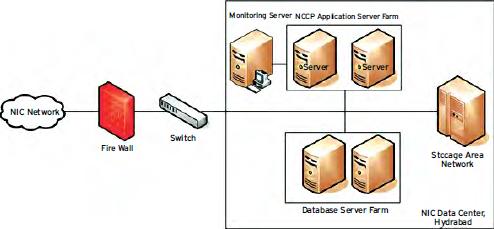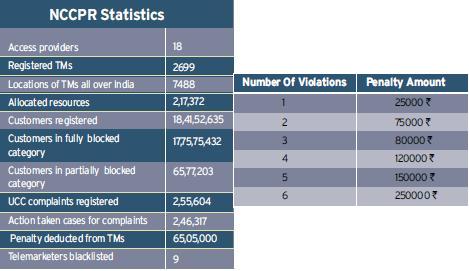
 Unsolicited marketing related calls are a major nuisance and every telecom user has the right to have freedom from such calls.
Unsolicited marketing related calls are a major nuisance and every telecom user has the right to have freedom from such calls.
Dr Shefali S Dash, Deputy Director General, National Informatics Centre, Government of India IPS Sethi, Senior Technical Director, National Informatics Centre, Government of India
With the intention of curbing unsolicited marketing related calls, the Telecom Regulatory Authority of India (TRAI) has set up the National Consumer Call Preference Registry (NCCPR), which has been operational since January 2011. The NCCPR is a database having the list of all telephone numbers of the subscribers who do not want to receive Unsolicited Commercial Calls (UCC) fully or have opted for partially blocked category. The telecom subscriber, who does not wish to receive UCC, can register their telephone number with their service provider for inclusion in NCCPR.
Telecom Service Provider uploads the telephone number to the NCCPR directory within three days of receipt. The telemarketer has to verify their calling telephone numbers list with the NCCPR before making a call. The telemarketers are given facility to download the DNC (Do Not Call) subscriber numbers, to make sure these numbers are not called. A penalty per call/message has been prescribed to discourage telemarketers who make calls to numbers registered in Do Not Call list. The defaulter telemarketer will face blacklisting of telecom service in case of continuous calling even after being penalised.

Key features of NCCPR
(i) Telemarketer(TM) Registration: According to the new regulation every TM shall register with TRAI and obtain a registration number for carrying out telemarketing activities. Single registration required for all the locations pertaining to a TM. The registration fee can be paid online (Net-banking/Credit/Debit cards) and offline mode (DD/Cash). A separate number series 140 is allocated for telemarketing activity by Access Providers (AP) to the TM

(ii) Telecom Customers Registration: A customer can register his/her number by calling or sending SMS at 1909. Registration with NCCPR can be for fully/partially blocking of unsolicited communication which will be effective with in 7 days. Calls are fully blocked, however Subscribers can choose the type of SMS they want from the TMs by setting the preferences
(iii) NCCPR Database: The customer data in NCCPR is updated twice a week by APs and provided online to APs/TMs for downloading so that the calling list could be scrubbed by them before making any call
(iv) Complaint Handling: Provision has been made for Complaint monitoring and blacklisting of TMs. The APs have to upload the complaints received online so that it could be monitored for the violations and blacklist the TMs. The defaulter TMs will face disconnection of telecom service and blacklisting in case of continuous sending of UCC even after being penalized
(v) Customer Registration with NCCPR
• Customer’s request for registration on the NCCPR is effected within 7 days from the date of registration with the AP
• Customer can register either in Fully Blocked category or Partially Blocked category Ex: SMS START 0 or START 1,4,7
to 1909.
• If the customer does not to want to get any commercial communication on any form either by voice or SMS, then the
number should be registered in the Fully Blocked category
• Customer can change preference after 7 days
 National Consumer Call Preference Registry (NCCPR) was launched by, Hon’ble Union Minister of Communications and IT Shri Kapil Sibal and Hon’ble MoS(C&IT) Shri Milind Deora and Shri Sachin Pilot on 27/09/2012 |
(vi) TM Registration and Responsibility
• Any person or legal entity engaging in the activity of telemarketing is required to register with TRAI by paying Registration Fee – Rs 1000/- and Customer Education Fee of Rs 9000
• Validity of the registration shall be three years unless revoked earlier
• TM shall enter into a standard agreement with the AP before applying for any telecom resources.
• TM shall not send any commercial communications to any Customer whose telephone number appears on the NCCPR,
except for sending SMS in respect of categories of preference opted by the customer
• The TM shall update their Customer Preference data regularly.
• They should scrub their calling list against the Customer Preference data before sending any SMS or telemarketing call.
• No UCC to be made between 2100 hrs to 0900 hrs irrespective of customer registration with NCPR.
• The TMs can deregister themselves if they have decided to not to do any telemarketing business
(vii) Role of Access Providers (AP)
• AP shall provide toll free short code 1909 for Registration of number by customer, De-registration of number, Change of preference, Registration of complaints
• AP shall ensure that no telecom resource is provided unless TM is Registered with TRAI, signed the standard agreement
with AP & Not blacklisted
• Resource allocation to TM is made under 140 series
• Maintain and upload Provider Customer Preference Register (PCPR) to NCCPR
• Keep PCPR updated by downloading incremental data from NCPR every Tuesday and Friday
• Upload the TMs who are exempted from sending more than 200 SMS on every Monday

IPS SETHI
(viii) NCCPR Data Synchronisation
This module provides the functionality required to update NCCPR. The process followed is:
• System synchronises NCCP registry on every Tuesday and Friday between 12.00 PM and 6.00 AM when the registry is
not be available to the APs to upload new numbers
• The synchronised data is available for download from 7 AM of Tuesday till 11:59 PM of next Thursday and from 7
AM of Friday till 11:59 PM Monday
• System generates CSV files containing IPS Sethi NCCP full registry for respective service provider and NCCP incremental data for all service providers
(ix) UCC Violation
• Calls/SMS made by the TMs, not complying with the Provisions of Regulations are termed as violations
• TM violating the regulations are penalised between Rs 25000/- for first violation to Rs. 250,000/- for sixth violation followed by blacklisting and debarding the TM for 2 years.
(x) Registration of UCC complaints
• Customer should register the UCC complaints within 3 days of receiving any UCC with their respective APs either by dialing or sending an SMS to 1909 as “COMP TEL NO XXXXXXXXXX; dd/ mm/yy; Time in hh:mm; short description of UCC” where XXXXXXXXXX is the telephone number or header of the UCC
• Unique complaint number will be sent by the AP through SMS
• The Service Provider uploads the UCC complaints daily
• Downloads the UCC complaints daily
• Informs customer regarding action taken on UCC complaints
• Updates NCPR with action taken against the Telemarketer
• Deposits penalty amount received from Telemarketer in TRAI account
 (xi) Payment Reconciliation
(xi) Payment Reconciliation
• Banker uploads the file containing the details of the successful transactions (online/offline) in the predefined format
and frequency in the NCCPR and initiates the reconciliation process
• NCCPR reconciles the payments made by the TMs for registration and APs for penalty deduction
• Bank would be intimated about unreconciled transactions
(xii) Customer Queries and MIS Reports Telecom Customer can view on the portal
• TRAI Regulations
• Registration status of a telephone number
• List of Registered TMs
• Status of Complaint registered
• Guidelines for Customers, Telemarketers, Access Providers TRAI can monitor the functioning of all the TMs and APs by various MIS reports
• Registration Details
• Resource Allocation
• Compliant Resolution
• Delay in action taken for complaints
• Notice Sent to TMs
• Penalty Deduction
• Payment reconciliation
• Blacklisted TMs
• Resource Disconnection
• TM agreement with Access Provider
• Audit Trial.

Technologies and System Architecture of NCCPR
NCCPR is built on object oriented design standard. Object oriented principles such as abstraction, inheritance, polymorphism is used extensively. Open standards have been followed and a rigid design standard has been put into play while designing this application. NCCP uses MVC architecture. Usage of this pattern isolates business logic from user interface considerations, resulting in an application where it is easier to modify either the visual appearance of the application or the underlying business rules without affecting the other components. In MVC, the model represents the information (the data) of the application; the view corresponds to elements of the user interface such as text, checkbox items, and so forth; and the controller manages the communication of data and the business rules used to manipulate the data to and from the model.
Software Specification
• Application Server: JBOSS Enterprise Application Platform – Enterprise Platform-5.0.0.GA
• Database Server: Oracle Database 11 G Enterprise Edition Release 11.1.0.6.0 g
• OS: Linux
This initiative of NCCPR is different, as it is one of its kind in the country. There is no similar project, which controls and monitors UCC as NCCPR does. As a matter of fact, very few countries in the world have implemented solutions to curb UCC. NCCPR is designed and developed by NIC for TRAI. The proof of the growing size of customers registered with NCCPR shows its popularity. The UCC has dropped down to a great extent after implementing the complaint module and
charging penalty from the Telemarketers. On the 6th violation the telemarketer number is disconnected and resources are removed. This is monitored by TRAI and users can view the status of the number, status of the complaint registered visibly in the portal
Be a part of Elets Collaborative Initiatives. Join Us for Upcoming Events and explore business opportunities. Like us on Facebook , connect with us on LinkedIn and follow us on Twitter, Instagram.











